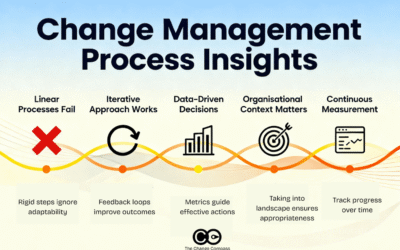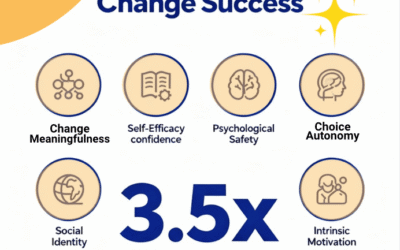
Have you ever wondered why change management deliverables as a part of the overall OCM solution are structured and sequenced the way they are in effective change management plans?
Organisational change management deliverables are defined as the data that is put in use in every activity in a change-management. Besides activities, deliverables can form an integral part of any change management project.
There is an inherent logical flow from which change deliverables feed into the next. This means that subpar quality in the deliverable earlier on happens if the work is inadequately carried out. Also, this will likely flow into the rest of the deliverables.
For the change management team, change management deliverables start out very high-level. Earlier in the project development lifecycle, there is a lot of unknown details which stops you from conducting detailed stakeholder management assessment and a communication plan. Moreover, there are lots of questions that cannot be answered about the nature of the change, what the new processes are, and training needs. More details presents itself as the project progresses through each phase. Therefore, the change practitioner is able to populate and document various details, including what the change means and how stakeholders will be impacted (i.e. the change impact assessment).
Eventually, each change deliverable contributes to the next, resulting in a detailed change plan. The change plan is a culmination of a detailed understanding. Also, it’s an assessment of the impacted stakeholders and what the changes will mean to them. Therefore, the respective change interventions within the change initiative that are critical to transition these key stakeholders from the current to future state. Change management communication, change readiness assessment and stakeholder engagement plan as well as effective training plan also form a core part of the change plan.
Along with the change management process as a part of the change strategy, one should create a system for managing scope of the change. Good project managers apply these components effectively to ensure project success through careful planning. Whether it’s a sudden change of personnel, new technology changes, change resistance or an unexpectedly poor quarter; Change managers should be adaptable enough to conduct risk assessment to apply the appropriate mitigations and changes to your plan to accommodate your company’s new needs.
For more details about the structure and flow of change deliverables download our infographic here.
What are the functions of change management?
Change management functions encompass planning, implementation, and monitoring of organizational changes. The change process ensures smooth transitions by managing effective communication of change impact, training efforts, and support to ensure positive outcomes. Additionally, it assesses impacts and adapts strategies into change management tasks to minimize resistance, ultimately fostering a culture that embraces change for improved overall performance and employee satisfaction.






